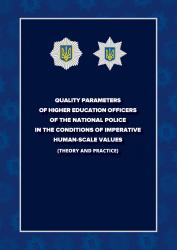Strategic guidelines for the quality of training of National Police officers in the context of Ukraine's integration into the European educational space
Keywords:
communicative competence, National Police of Ukraine, human rights and freedoms, ethical principles, interaction, personnel policy, convention, rules (codes) of ethical behavior, psychological contact, reform, humanity, police deontology, leader, law enforcement system, courage, police ethics, leadership, law enforcement agencies, honesty, corruption, self-organization, law and order, responsibility, child protection, self-development, professional identity, justice, minor, narrative professional ethics, legal and psychological foundations official activities, respect, traumatic events events, trust, professional activity, moral behavior, stress, police, service training, legal basis of professional ethics, child-friendly room, National Police of Ukraine, professional training of a police officer, ethical principles, psychological safety g compliance, personnel policy, professional selection, rules (codes) of ethical behavior, resilience, reform, training of police officers, police deontology, psychological resources, law enforcement system, professionalization of law enforcement officers, police ethics, education, law enforcement agencies, personality of a police officer, corruption, EU educational policy, law and order, value experience, child protection, education applicant, professional identity, competence, minor, transformational learning, legal and psychological foundations official activities, communicative competence, traumatic events events, forms and methods of education, professional activity, interaction, stress, education quality, service training, psychological contact, child-friendly room, assessment, professional training of a police officer, leader, psychological safety g compliance, police performance assessment, professional selection, leadership, resilience, departmental assessment, training of police officers, self-organization, psychological resources, assessment procedure, professionalization of law enforcement officers, self-development, education, work program of the academic discipline, personality of a police officer, narrative professional ethics, EU educational policy, assessment methods, value experience, moral behavior, education applicant, criterion analysis, competence, legal basis of professional ethics, transformational learning, assessment criteria, forms and methods of education, learning outcomes, education quality, behavioral diagnostics, assessment, workshop, police performance assessment, psychological training, departmental assessment, psycho-pedagogical support, assessment procedure, pedagogical skills, work program of the academic discipline, pedagogical skills of a higher school teacher, assessment methods, advanced training of scientific and pedagogical personnel, criterion analysis, assessment criteria, learning outcomes, behavioral diagnostics, workshop, psychological training, psycho-pedagogical support, pedagogical skills, pedagogical skills of a higher school teacher, advanced training of scientific and pedagogical personnelAbstract
Chapter 1 defines the strategic guidelines for the quality of training of the National Police officers in the context of Ukraine's integration into the European educational space. The historical conditions for the emergence and improvement of police bodies in different states are studied. The problems of carrying out reforms in Ukraine are analyzed and the main directions for improving the processes of establishing a new law enforcement system of Ukraine in the context of Ukraine's integration into the European educational space are determined. A clear position has been formulated regarding the fact that, along with the assertion of Ukrainian identity and historical memory in the process of training officers of the National Police as a synergy of national and universal achievements, modern civilizational achievements and global world trends, the vector of Ukraine's development is European integration, the widespread introduction of European and world standards in the field of life and functioning of the state. It has been proved that all the processes associated with reforming the law enforcement industry are not just “technical” external changes in the activities of police institutions, but will have a deep psychological and pedagogical meaning. In the context of reforming the National Police of Ukraine, organizational changes should have a positive personally significant meaning for employees, which is provided by appropriate programs aimed at creating a sense of psychological security, accessibility of means of adaptation and personal involvement in these changes.

QUALITY PARAMETERS OF HIGHER EDUCATION OFFICERS OF THE NATIONAL POLICE IN THE CONDITIONS OF IMPERATIVE HUMAN-SCALE VALUES
Downloads
Pages
Published
Categories
License

This work is licensed under a Creative Commons Attribution-NonCommercial-NoDerivatives 4.0 International License.

